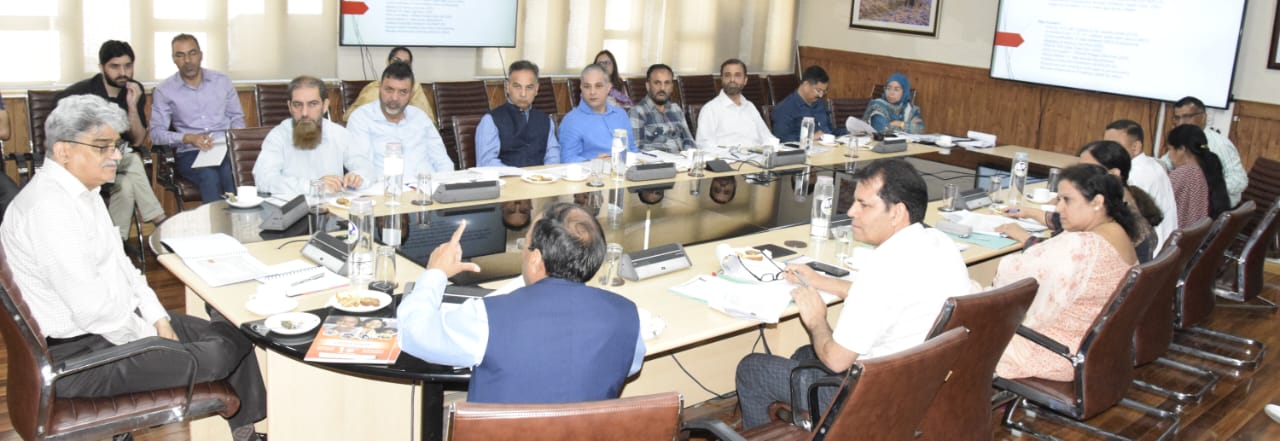SRINAGAR, JULY 12: The Social Welfare Department is currently implementing 37 Centrally Sponsored Schemes and 9 UT schemes, backed by a budgetary allocation of Rs 4,361 crore for FY 26.
There are around 28,000 Anganwadi Centres (AWCs) across the UT, which cater to nearly 9 lakh beneficiaries, ensuring last-mile delivery of services.
The details were shared in a meeting chaired by Chief Secretary, Atal Dulloo, to review the implementation of various welfare schemes meant for marginalized and vulnerable sections of society.
The meeting comprehensively reviewed key initiatives under Mission Poshan (7 schemes), focusing on improving the nutritional levels among children and others. Mission Shakti (6 schemes) aimed at empowering women, ensuring their safety, empowerment, and protection. Mission Vatsalya (7 schemes) focuses on institutional care and protection for different sections of society in need.
Other centrally sponsored schemes discussed included SMILE (Support for Marginalized Individuals for Livelihood and Enterprise), Atal Vayo Abhyudaya Yojana (AVYAY) and SAPSrC, PM-AJAY (Prime Minister’s Anusuchit Jaati Abhiyan Yojana), PM-YASASVI Scholarships, NAPDDR (Drug Demand Reduction), NSAP (National Social Assistance Programme), Scholarships for Minority, SC, and OBC communities, ALIMCO-supported Prosthetic Aids, implementation of SC/ST Prevention of Atrocities Act, NAMASTE (Sanitation Workers’ Welfare), PMJVK (Pradhan Mantri Jan Vikas Karyakram), besides others.
The review also covered UT government schemes like ISSS (Integrated Social Security Scheme), Ladli Beti, Marriage Assistance Scheme, SC Scholarship, Homes for those in distress, Pahari Hostels, Mobility Support to Specially-abled (scooties/prosthetics), Pensions for the needy, and assistance to militancy-affected families.
As part of the ongoing efforts for the upcoming fiscal year 2025-26, the Department revealed that consolidated proposals under various centrally sponsored schemes, amounting to a total of Rs 1088.75 crore, have been submitted. Out of these, major schemes such as Mission Poshan and ICDS (Rs 759.67 Cr), Mission Shakti (Rs 40.79 Cr), and Mission Vatsalya (Rs 126.54 Cr) have already received approval. Additionally, proposals for PMMVY (Rs 64.39 Cr) and BBBP (Rs 6.20 Cr) have also been approved.
Several proposals have been submitted and are currently awaiting approval. These included financial allocations for the implementation of schemes under the Prevention of Atrocities Act 1989, Senior Citizen Homes, Saksham Anganwadi Centres, Creche (Palna), Pre- and Post-matric Scholarships for SC students, NAPDDR, including NMBA and PM-YASASVI.
The Chief Secretary underscored the urgent need to upgrade all the Anganwadi Centres (AWCs) with basic facilities such as electricity, drinking water, toilets, and other utilities.
Dulloo emphasized monitoring the outcomes of nutrition-based interventions targeting children, adolescent girls, and lactating mothers under the Poshan Scheme. He stressed that tracking measurable outcomes is critical for ensuring real progress at the grassroots level.
The Chief Secretary also called upon the Programme Officers and DSWOs to frequently conduct field visits to assess on-ground realities and align their actions with actual needs. He remarked that all decisions should stem from field-level insights and reflect the actual realities of our people.
In a forward-looking suggestion, Dulloo asked the department to explore the concept of Composite Homes in districts to house the orphaned children, elderly citizens, and the destitute women together, providing them with a sense of community and shared care, reducing isolation.

